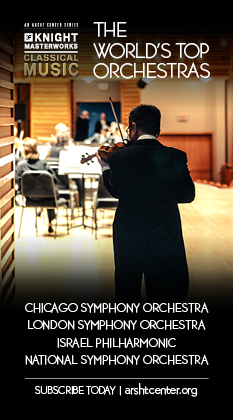Even with multiple changes, Paris Trio shines at New World Center

The Paris Piano Trio performed music of Haydn, Beethoven and Schumann Thursday night at New World Center in Miami Beach.
Friends of Chamber Music presented the Paris Piano Trio Thursday night, not at its usual venue, Gusman Concert Hall, but at the New World Center in Miami Beach in a program replete with changes of venue, personnel and programming.
Originally scheduled for the new campus’s chamber music room, the concert was moved to the main concert hall because of scaffolding and continuing construction work in the smaller venue.
The trio’s pianist Jean-Claude Pennetier suffered a fainting spell in Paris and was replaced for this tour by Claire Desert, one of his former students. Probably due to the reconfigured ensemble, scheduled rarities by Chopin and Faure were jettisoned in favor of familiar Haydn and Beethoven, leaving only Schumann’s D Minor Trio from the originally announced program. Still, the level of music-making was so consistently excellent that none of the changes greatly mattered.
Ms. Desert proved to be an artist of exceptional gifts. Not only did she blend seamlessly with violinist Regis Pasquier and cellist Roland Pidoux but she exhibited a lightness of touch, sensitivity of phrasing and nuanced artistic refinement that are the marks of a distinguished artist. Playing the New World Symphony’s house Yamaha, Desert drew the most elegant, gleaming tones and subtle range of dynamics from an instrument that usually sounds harsh and monochromatic. Along with her colleagues, she was aided by the new hall’s impressive acoustics, the strong bass response and clarity and richness of the sound a boon to chamber music performance.
The trio’s musical approach is typically Gallic, emphasizing tonal warmth and aristocratic expansiveness; yet this group can summon power and storm the heavens when musically appropriate.
Haydn’s Trio in G Major played to the ensemble’s lighter side. The pearly delicacy of Desert’s piano and mellifluous interplay of voices launched the initial Andante beguilingly. Pasquier’s sweet-toned violin sang the sentimental melody of the Poco adagio with heavenly serenity. The players took the final Presto at the most rapid clip imaginable, never sacrificing clarity of articulation or elegance of line.
Beethoven’s Ghost Trio in D Major, Op.70, No. 1 is filled with mood swings from lyrical strophes to eerie, disturbing harmonies and outbursts of blazing energy. The Paris threesome proved equal to the challenges in a performance that illuminated Beethoven’s distinctive sound world. Pasquier and Pidoux molded Beethoven’s melodic lines with eloquence, both in the lightness of the initial Allegro vivace and the dark mystery of the Largo. In the final Presto, the musicians gave proper weight to every one of Beethoven’s sudden, dramatic pauses while never impeding the glorious, flowing stream of melody.
Schumann’s Trio in D Minor is a drama of stormy musical seas, leavened by interludes of uneasy calm. This highly charged score brought out the powerhouse side of the Paris players. They charted the emotional roller coaster of the opening movement with a wide dynamic range and incendiary turbulence. Pidoux’s cello solo was striking for its unique tonal color. The sense of nervous energy continued in the whirlwind scherzo, here marked by an undercurrent of tragedy with incisive string playing delineating the movement’s ambivalence to telling effect.
The unmoored harmonies of the slow movement were subtly conveyed amidst Schumann’s lyrical piano line, Desert sounding the repeated triplets authoritatively. Like the finale of Schumann’s Symphony No. 2, the concluding movement is a joyous celebration of victory over despair. The major theme’s upward trajectory was charged with buoyancy and verve, the extended coda a final exuberant exclamation point to an impressive performance.
Posted in Performances
Leave a Comment
Fri Feb 18, 2011
at 12:15 pm
No Comments



